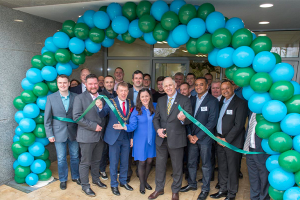EMC VFCache Interesting but Limited, Says Wikibon Community
![]() The Wikibon community sees EMC’s VFCache, announced Monday, as interesting but limited and in large part an effort by EMC to freeze the market, in this case for flash PCIe cards in servers, at least among EMC users. That is the take-away from the Wikibon Peer Incite meeting today discussing the implications of the announcement. The video recording of the meeting can be seen on SiliconAngle.tv.
The Wikibon community sees EMC’s VFCache, announced Monday, as interesting but limited and in large part an effort by EMC to freeze the market, in this case for flash PCIe cards in servers, at least among EMC users. That is the take-away from the Wikibon Peer Incite meeting today discussing the implications of the announcement. The video recording of the meeting can be seen on SiliconAngle.tv.
One community member, for instance, asked whether VFCache can be used with blade servers. The answer is no, says Wikibon CTO David Floyer. That will come with Project Thunder, EMC’s PCIe server utility, which will be a separate box that can be shared among servers and is promised for later this year.
Similarly VFCache is designed to be integrated with the underlying storage array, but today that integration is limited, although again EMC is promising that its FAST automated tiering controller will be extended to include VFCache again later this year. Floyer did note that EMC has a good track record in fulfilling its promises of future technology more or less within the promised timeframe, “so I expect we will see a series of announcements over the next year.”
However, said Wikibon analyst Nick Allen, this occupies a very different space from the flash card systems of companies like Fusion-io. While they are focused more on big data capture and near-real-time analysis with a large number of fast writes and initially are selling mainly to the big cloud service providers, EMC is focusing more on supporting more traditional business applications such as ERP and CRM for its customer base of mid-to-enterprise sized organizations.
Floyer, who led the discussion, presented three diagrams of the evolution of the new server/storage architecture he has proposed, which he had published on the Wikibon site before the meeting. He and others did question the wisdom of EMC trying to control the Project Thunder box using FAST, which runs on the storage array, suggesting that unless it is moved to the server it will not be able to keep up with the speed of a large, central collection of PCIe flash cards.
He also noted the irony of EMC, which had been a driver in the physical separation of storage from server back in the 1990s, now extending its storage onto the server. Another irony is that EMC, which owns VMware, has yet to integrate VFCache into the virtualized computing environment. That presumably will also come sometime in the next year.
The community consensus is that PCIe flash spells the end of high-speed disk systems like EMC’s Symetrix and specifically 15K disk drives, although flash in the disk array, which EMC pioneered in 2008, will play an important ongoing role. However, Floyer warned, this evolution will take a decade to complete and will require substantial updates of server operating systems, the IO stack, and enterprise applications.
VFCache, as a primarily read-only cache system populated out of the storage array rather than a read/write solid state storage system, is also limited in the applications it can benefit. Floyer said that it should be considered for applications that do at least as many reads as writes of data and that are performance-constrained by the speed of disk reads, and in particular applications with random data reads.
However, for those applications it does provide a way for users to take advantage of the order-of-magnitude latency decreases that PCIe flash offers without having to rewrite the application. As such, in the end it is a useful product for a portion of EMC’s user base, and as EMC adds features it will become more useful.
A message from John Furrier, co-founder of SiliconANGLE:
Your vote of support is important to us and it helps us keep the content FREE.
One click below supports our mission to provide free, deep, and relevant content.
Join our community on YouTube
Join the community that includes more than 15,000 #CubeAlumni experts, including Amazon.com CEO Andy Jassy, Dell Technologies founder and CEO Michael Dell, Intel CEO Pat Gelsinger, and many more luminaries and experts.
THANK YOU











